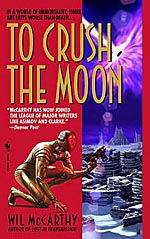
![]() Triseult
Triseult
3/24/2012
![]()
To Crush the Moon is part 4 of Wil McCarthy's Queendom of Sol series. The first three novels in the series are: The Collapsium, The Wellstone, and Lost in Transmission. If you haven't read any of these, I would strongly recommend you'd stop reading this review right now, and pick the first novels. Myself, I read Lost in Transmission first, and fell in love with the wonderful mix of character development and hard SF that Wil McCarthy provides.
That being said, is To Crush the Moon as good as Lost in Transmission? I'm afraid it's not. It's certainly a great novel for many reasons, but I found only traces in To Crush the Moon of what made Lost in Transmission so magical to me. Lost in Transmission was self-contained, and focused on characters trying to survive, and coming to odds over differences in philosophy. It was a beautiful novel because it didn't have any enemies, nor the need to set clear goals for its immortal characters.
To Crush the Moon picks up after Conrad Mursk returns from the doomed colony of King Bascal's Sorrow, and takes the reader from the last glory days of the Queendom of Sol, to the dystopian, distant future where we've previously seen King Bruno and Conrad battle armies of robots. This setting is hardly a spoiler, as it has been hinted at ever since The Collapsium, in the opening and closing chapters. How it happens is interesting and consistent with the themes that McCarthy has establish ever since The Collapsium, but I couldn't help but feel it was a bit rushed. The Fall of the Queendom of Sol is, alas, not so grandiose.
What makes the novel a worthy entry in McCarthy's bibliography, however - albeit not a superior entry than Lost in Transmission - is what happens next. McCarthy essentially takes a hard SF world, which he has built carefully over four novels, and pushes his science to such an extreme that he builds a fantasy world out of it. "Any sufficiently advanced science" indeed.
And McCarthy takes great pleasure in this: a solid half of the novel is spent taking naive observers through the ruins of the Queendom of Sol, as they witness technology so advanced they take their creators for gods. It's incredibly amusing, then, when said gods are self-effacing Conrad Mursk and withdrawn ex-King Bruno. There are many scenes in To Crush the Moon that seem to exist mostly to poke fun at fantasy conventions, as Bruno and Conrad seem to be winking in aparté at the reader over how other men marvel at the "magic" they witness.
That's very interesting for a while, but it's unfortunate that McCarthy doesn't really take the concept for a spin. The rest of the novel plays out as a traditional fantasy novel with plausible SF explanations, but with all the trappings of the genre. The main characters actually spend a long time just Travelling All Over The Map And Marvelling At The World, which gets tedious here as it does in any fantasy novel.
Ultimately, the end of the novel, and thus of the Queendom of Sol series, is bittersweet, and somewhat underwhelming. I wish more time had been spent on the fates of Bascal, Xmary and Tamra, instead of spoofing a fantasy quest. Alas, fans of King Bascal, such as myself, will have to go back to Lost in Transmission to enjoy him again.
All in all, To Crush the Moon is an excellent, witty hard SF novel; I just wish it wasn't the conclusion to such a beloved series of mine.